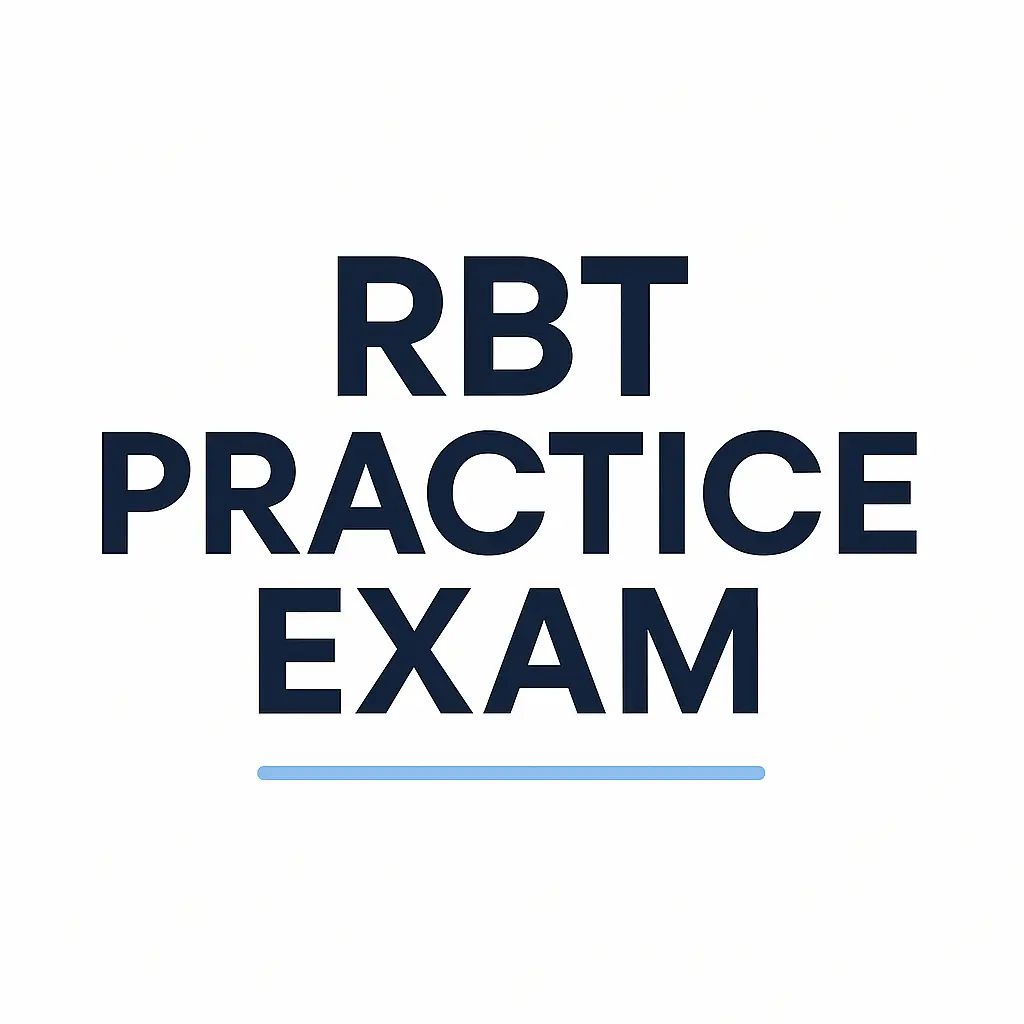Ace the RBT Exam on Your First Attempt
Challenge yourself with our updated 2025 RBT practice test! Sharpen your skills, identify areas for improvement, and build the confidence needed to pass the exam. Start practicing now and take the next step toward RBT certification!
Mock Quiz Application
Quiz Paused
What is RBT Practice Exam?
RBT Practice Exam is a dedicated learning hub for aspiring Registered Behavior Technicians. Whether you’re a beginner preparing for the BACB exam, an experienced professional refreshing your knowledge, or someone looking to stay updated with the latest ABA scenario challenges, our platform offers:
In-Depth RBT Study Guides
Gain access to detailed study materials covering all sections of the RBT Task List, including ethics, data collection, and behavior reduction techniques.
Full-Length Practice Exams
Test your knowledge with RBT mock exams that mimic the actual Board-Certified RBT exam, helping you get familiar with the format and question types.
Expert Exam Tips & Strategies
Learn from ABA professionals who provide valuable study techniques, time management skills, and test-taking strategies to help you pass on your first attempt.
RBT PRACTICE EXAM
Stay Ahead with RBT Insights & Resources
Latest RBT Exam Updates – Stay informed on any changes in the exam format and requirements.
ABA Career Tips – Explore opportunities for growth in the field of behavior analysis.
Real-World Scenarios – Learn how to apply RBT principles in everyday client interactions.
Your journey to becoming a certified RBT starts here. Take your first step towards passing the RBT exam with confidence by accessing our expert resources today!
RBT Certification 101
What is a Registered Behavior Technician (RBT)?
A Registered Behavior Technician (RBT) is a paraprofessional certified in behavior analysis, working under the supervision of a Board Certified Behavior Analyst (BCBA) to implement behavior-analytic services. RBTs primarily support individuals with autism or developmental disabilities, focusing on improving behavioral outcomes and quality of life.
What are key responsibilities of an RBT?
- Implement Behavioral Interventions
Execute behavior intervention plans designed by BCBAs to reinforce positive behaviors. - Data Collection & Reporting
Record precise data on client progress to evaluate intervention effectiveness. - Skill Development
Teach social, communication, and adaptive skills critical for daily living. - Collaboration
Partner with families and professionals to ensure consistent interventions across settings.
Define Becoming an Registered Behavior Technician (RBT)?
- Eligibility : 18+ years old, high school diploma.
- Training : Complete a 40-hour RBT Task List course.
- Competency Assessment : Demonstrate skills via a BCBA-supervised evaluation.
- Exam : Pass the RBT certification exam (85 questions, 75 scored).
- Ongoing Supervision : Maintain certification through regular BCBA oversight.
What is the structure of the RBT exam?
The RBT exam consists of multiple sections, each covering essential topics in applied behavior analysis (ABA):
| Content Area (Current – 2nd Ed.) | Questions (Current) | Key Topics (Current – 2nd Ed.) | Content Area (Effective Jan 1, 2026 – 3rd Ed.) | Questions (2026) | Key Topics Changes (2026 – 3rd Ed.) |
|---|---|---|---|---|---|
| Measurement | 12 (16%) | Continuous measurement (frequency, duration), discontinuous measurement (partial/whole interval), data and graphing. | Data Collection and Graphing | 13 (17%) | Key topics remain, plus new tasks: calculating and summarizing data (e.g., rate, mean), identifying trends on graphs, and describing risks of unreliable data. |
| Assessment | 6 (8%) | ABC data collection, assisting with preference assessments and functional assessments. | Behavior Assessment | 8 (11%) | Focus remains on assisting with functional and preference assessments. The increased weight reflects a greater emphasis on these supportive roles. |
| Skill Acquisition | 24 (32%) | Reinforcement, discrete-trial training (DTT), naturalistic teaching, shaping, chaining, prompting, token systems. | Behavior Acquisition | 19 (25%) | All key topics remain central. The reduction in questions rebalances this domain with others, though it is still the largest section. |
| Behavior Reduction | 12 (16%) | Antecedent interventions, differential reinforcement (DRA/DRI/DRO), extinction procedures. | Behavior Reduction | 14 (19%) | Key topics remain, plus new tasks: implementing positive and negative punishment procedures (e.g., time-out) and describing secondary effects of extinction and punishment. |
| Documentation and Reporting | 10 (13%) | Graphing data, generating objective session notes, reporting variables (e.g., illness, relocation) that may affect the client. | Documentation and Reporting | 10 (13%) | This domain’s title, question count, and key topics remain unchanged. |
| Professional Conduct and Scope of Practice | 11 (15%) | Client dignity, confidentiality, professional boundaries, scope of competence, collaboration with supervisor (BCBA/BCaBA). | Ethics | 11 (15%) | Key topics remain, plus new tasks: applying core ethical principles, following specific gift-giving guidelines, and demonstrating cultural humility and responsiveness. |
| Exam Summary | Total: 85 MCQs (75 Scored) | Based on the RBT Task List (2nd ed.) with 37 tasks. | Exam Summary | Total: 85 MCQs (75 Scored) | Based on the RBT Test Content Outline (3rd ed.) with 43 tasks. |
Why rbtpracticeexam.us?
Prepare for the RBT exam with 2025-aligned resources :
- Multiple Full-Length Practice Exams ($47k–$57k average salary awaits certified RBTs).
- Detailed Answer Explanations for all 85-question practice tests.
- Task List 2.0 Study Guide covering Measurement, Skill Acquisition, Behavior Reduction, and more.
How hard is the RBT exam?
The exam focuses on applied scenarios, not just memorization. Our practice tests mimic the BACB®’s question style to build critical thinking and strengthen your RBT specific vocabulary.
What’s the difference between RBT training and certification?
Becoming a Registered Behavior Technician (RBT) requires both training and certification, each serving a distinct purpose. Understanding these steps ensures a smoother journey toward becoming a certified RBT!
RBT Training
- Provides foundational knowledge in Applied Behavior Analysis (ABA).
- Prepares individuals to work under a Board Certified Behavior Analyst (BCBA).
- Covers topics such as:
- Behavior analysis principles
- Ethical guidelines
- Data collection & behavior intervention skills
- Requires completion of a 40-hour training program (prerequisite for certification).
- Available via online courses or in-person workshops.
- Costs usually range from a few hundred to several hundred dollars.
RBT Certification
- Confirms competency in ABA techniques for working with individuals with autism and developmental disabilities.
- Process includes:
- Completing the 40-hour training.
- Applying for certification with the Behavior Analyst Certification Board (BACB).
- Passing the RBT certification exam.
- Completing a competency assessment.
- Benefits include:
- Professional recognition and career advancement.
- Increased job security and credibility.
- Costs Includes application, exam, and renewal fees; requires yearly renewal.
Can we take RBT exam/test online?
No. Since 2023, exams are only at Pearson VUE centers. Our mock tests simulate the in-person format.
What is the salary range for an RBT technician?
In 2025, U.S. Registered Behavior Technicians (RBTs) earn $47k–$57k annually , with career opportunities in schools, autism centers, and telehealth. Advancement to roles like Board Certified Behavior Analyst (BCBA) drives professional growth.
Where do RBTs typically work?
RBTs are hired by schools, autism centers, private clinics, and telehealth platforms.
Your Ultimate Guide to RBT Exam Success
Prepare smarter with our latest 2025 RBT practice test. Tackle real exam-style questions, track your progress, and gain the confidence you need to succeed on your first try. Begin your journey toward RBT certification today!








